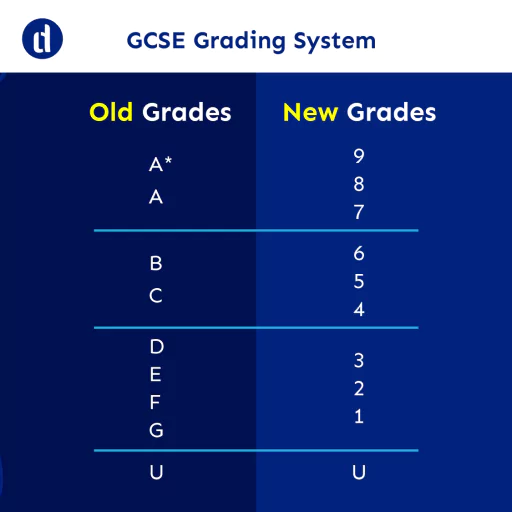The world of academia and education is vast, diverse and at times, incredibly complex. To pursue certain jobs requires you to complete certain qualifications, such as a GCSE, and you usually need a range of preliminary qualifications at specified grades to obtain these qualifications in the first place.
This can result in a lengthy and specific course of study which can take years of your life to achieve. The end result is worthwhile, but figuring out this path can be a challenge.
It doesn’t help matters when significant changes are made to the education system to confuse the process even more. One such change that has caused a stir is the new GCSE grading system, which saw the traditionally used letters be replaced with numbers, creating new GCSE grade equivalents.
As GCSEs are the first objective evidence of your knowledge level and academic ability, they play a huge part in your educational and professional journey post-school. This is why it’s imperative that you know exactly what your results entail. If you want the new GCSE grades explained, keep reading. We identify GCSE grade 3 equivalent, grade 2 GCSE equivalent, and everything in between!
Why Have the GCSE Grades Changed?
In short, the GCSE grading system was changed to provide more differentiation at the top end of the grading spectrum. This was to help provide a more accurate picture of a learner's ability. Where previously the pass grades were limited to C, B, A and A* for the highest achievers, now you have grades 4, 5, 6, 7, 8 and 9.
The opposite can be said for the lower end of the GCSE grading system. Previously failed GCSE grades came in at grades D, E, F and G, with U being ‘Unclassified’. Now, failed GCSE grades come in at 3, 2 and 1, with U being the only constant in the GCSE grading system.

What are the GCSE Grades Now?
Today, the new GCSE grade equivalents range from 1 to 9, with 9 being the highest a learner can achieve. This has resulted in consistent questions from learners trying to get their heads around it all, as they ponder things like ‘What do GCSE grades 1-9 mean?’. This can be a confusing concept to master, whether you're studying a GCSE English course online, a GCSE Maths online course, or GCSE Science course.
To help, we have answered some of the common questions surrounding the GCSE number grades below:
1. Is 7 an A in GCSE?
Yes! A grade 7 is now equal to a grade A in the old system.
2. What is a 4 grade GCSE?
If you achieve a grade 4 in your GCSEs, then it is considered the same as the old grade C, under the GCSE grade equivalents.
3. Is a 3 a pass in GCSE?
No, the GCSE grade 3 equivalent is in between the traditional grades D and E.
4. What GCSE grade is a pass?
The Department of Education recognises a GCSE grade 4 and above as a ‘standard pass’, which is the equivalent of the old grade C or above in the traditional GCSE grading system.
To further help explain the GCSE grading system, we have included a visual chart of the new GCSE grades compared to the old below:

Do GCSE Grades Matter for University?
Yes! GCSE qualifications are a very important component in meeting the requirements for a university degree. You will find most universities expect at least a grade C/4 in English and Maths, sometimes they also want the same in Science too.
Though certain degree subjects will go further and ask for specific GCSE subjects with certain grades. This can be anywhere from up to seven GCSE subjects with excellent marks! This is often the case with career-related degrees like Engineering, Veterinary Science, Medicine, Dentistry and Teaching.
Do Employers Check GCSE Grades?
A lot of them do, this is because some roles require a minimum number of qualifications to obtain employment. The reason for this could boil down to it being an industry standard, but it’s also equally possible for it to be company policy.
In any case, you will find most employers want you to have basic literacy and numeracy skills, and GCSEs are an ideal way of measuring these. For this reason, GCSEs are incredibly important as they enable employers to quickly compare you against other applicants.
As a rule of thumb, most employers look for a grade of C/4 or above in the core subjects of English and Maths. You will also find a lot of apprenticeships also look for certain grades at GCSE, with advanced apprenticeships looking for five GCSEs at grades 9 to 4, including English and Maths.
Overall, the more GCSEs you have at a higher grade, the more freedom you will have to explore different job opportunities and the potential to earn a higher wage.
Do Universities Accept GCSE Equivalents?
Yes, they do! Universities are becoming more open to prospective students who have alternative forms of evidence of their ability. Namely, this is equivalent to qualifications like Functional Skills Level 2, but it can also extend to work experience and professional qualifications.

Can I Study GCSEs and Equivalents Online?
Absolutely! With the advent of online study, now you can gain your GCSE education and many other forms and levels of education online.
With learndirect, you can study both GCSE courses and equivalent qualifications from the comfort of your home. Whether you are looking for a GCSE Science online course or GCSE Maths and English courses for adults online, we can help.
Our online GCSE courses include:
You can also study online GCSE courses in:
You can find these on our GCSE qualification page.
Our online GCSE equivalent courses include English GCSE equivalent courses like:
- Functional Skills English Level 2 Excluding Exam
- Functional Skills English Level 2 Including Online Exam
Online Maths GCSE equivalent courses like:
Plus online combined Maths and English GCSE equivalent courses such as:
- Functional Skills Maths and English Level 2 Excluding Exam
- Functional Skills Maths and English Level 2 Inc. Online Exam
You can find these and more on our Functional Skills qualification page.

Enrol Now!
If you’re looking to gain the GCSE or Level 2 equivalent qualifications you need to progress in academia and beyond, learndirect will help you achieve your goal.
Our online courses help you continue your education at a time that suits you, so you can get the knowledge you need without impacting your schedule. By now, you will have a solid understanding of GCSE grade equivalents. So, all you have to do now is enrol on your online GCSE courses. UK learners can find out more by calling our Course Executives on 01202 006 464 or by contacting them online.



















